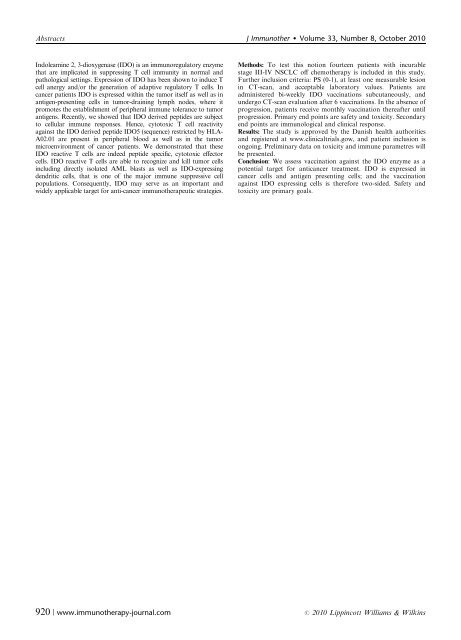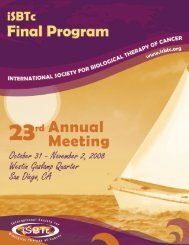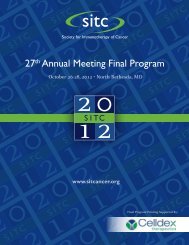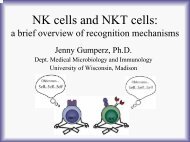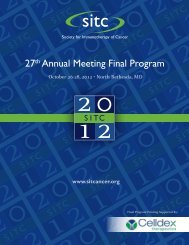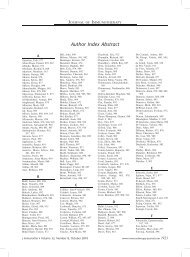Abstracts for the 25th Annual Scientific Meeting of the International ...
Abstracts for the 25th Annual Scientific Meeting of the International ...
Abstracts for the 25th Annual Scientific Meeting of the International ...
Create successful ePaper yourself
Turn your PDF publications into a flip-book with our unique Google optimized e-Paper software.
<strong>Abstracts</strong> J Immuno<strong>the</strong>r Volume 33, Number 8, October 2010<br />
Indoleamine 2, 3-dioxygenase (IDO) is an immunoregulatory enzyme<br />
that are implicated in suppressing T cell immunity in normal and<br />
pathological settings. Expression <strong>of</strong> IDO has been shown to induce T<br />
cell anergy and/or <strong>the</strong> generation <strong>of</strong> adaptive regulatory T cells. In<br />
cancer patients IDO is expressed within <strong>the</strong> tumor itself as well as in<br />
antigen-presenting cells in tumor-draining lymph nodes, where it<br />
promotes <strong>the</strong> establishment <strong>of</strong> peripheral immune tolerance to tumor<br />
antigens. Recently, we showed that IDO derived peptides are subject<br />
to cellular immune responses. Hence, cytotoxic T cell reactivity<br />
against <strong>the</strong> IDO derived peptide IDO5 (sequence) restricted by HLA-<br />
A02.01 are present in peripheral blood as well as in <strong>the</strong> tumor<br />
microenvironment <strong>of</strong> cancer patients. We demonstrated that <strong>the</strong>se<br />
IDO reactive T cells are indeed peptide specific, cytotoxic effector<br />
cells. IDO reactive T cells are able to recognize and kill tumor cells<br />
including directly isolated AML blasts as well as IDO-expressing<br />
dendritic cells, that is one <strong>of</strong> <strong>the</strong> major immune suppressive cell<br />
populations. Consequently, IDO may serve as an important and<br />
widely applicable target <strong>for</strong> anti-cancer immuno<strong>the</strong>rapeutic strategies.<br />
Methods: To test this notion fourteen patients with incurable<br />
stage III-IV NSCLC <strong>of</strong>f chemo<strong>the</strong>rapy is included in this study.<br />
Fur<strong>the</strong>r inclusion criteria: PS (0-1), at least one measurable lesion<br />
in CT-scan, and acceptable laboratory values. Patients are<br />
administered bi-weekly IDO vaccinations subcutaneously, and<br />
undergo CT-scan evaluation after 6 vaccinations. In <strong>the</strong> absence <strong>of</strong><br />
progression, patients receive monthly vaccination <strong>the</strong>reafter until<br />
progression. Primary end points are safety and toxicity. Secondary<br />
end points are immunological and clinical response.<br />
Results: The study is approved by <strong>the</strong> Danish health authorities<br />
and registered at www.clinicaltrials.gow, and patient inclusion is<br />
ongoing. Preliminary data on toxicity and immune parametres will<br />
be presented.<br />
Conclusion: We assess vaccination against <strong>the</strong> IDO enzyme as a<br />
potential target <strong>for</strong> anticancer treatment. IDO is expressed in<br />
cancer cells and antigen presenting cells; and <strong>the</strong> vaccination<br />
against IDO expressing cells is <strong>the</strong>re<strong>for</strong>e two-sided. Safety and<br />
toxicity are primary goals.<br />
920 | www.immuno<strong>the</strong>rapy-journal.com r 2010 Lippincott Williams & Wilkins


